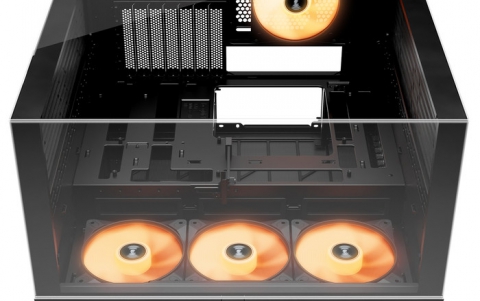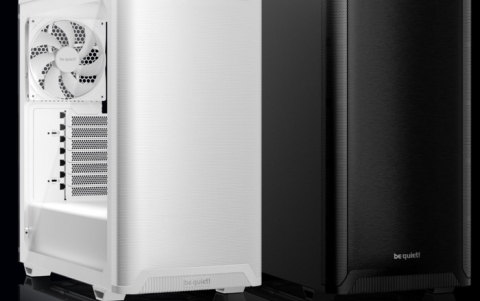
Hard-Disk Drives Could Sound Better than CDs
Sometimes the jitter introduced in the Digital to Analogue (D/A) circuits ant the S/PDIF interface of a CD player could make reproduction of an audio CD sound worse than what you get when you play back a file from a hard-disk drive.
Robert Harley posted an interesting article on his blog describing his experiences when he tried to compare the audio quality of a CD played back on a CD player device versus the sound quality of files made from the same CD, copied to and then played back from a hard-disk drive.
Specifically, he compared the sound of the Sooloos and Qsonix servers to a CD transport, alternately feeding the music server and the CD transport to an Esoteric D-03 digital-to-analog converter through the same digital interconnect.
"Listening to the same CD from Sooloos and from the transport, I heard a subtle but noticeable improvement in sound quality from the music server. I heard more space, air, bloom, and soundstage depth when the audio data were read from the Sooloos hard drive rather than from the CD. The hard-drive-sourced sound had better resolution of low-level detail, particularly reverb decay, which is why the presentation sounded more airy and spacious. The presentation was gentler, a little more laid-back and relaxed, and had a greater sense of ease. I repeated this comparison with the Qsonix server and heard a similar increase in resolution, improvement in spaciousness and depth, smoother textures, and more relaxed presentation. In fact, the two music servers sounded very much alike," Harley commented.
Harley focused on the effects of jitter in the reproduction of the audio CDs. He claims that the jitter introduced by the DAC as well as the S/PDIF of the audio player had an audible effect on the audio quality of the CD. To test this claim, he enabled the separate clock link available on the CD transport that slaves the transport to the processor?s clock, a feature that greatly reduces jitter in the D/A?s word clock. This clock controls precisely when the DAC converts the incoming samples to analog, which is the point where jitter matters. By enabling this separate clock link he avoided any jitter-inducing effects of the S/PDIF interface and the DAC became the timing reference for the entire system.
"Engaging this clock (lowering the jitter) when listening to a CD rendered an improvement in sound quality virtually identical to what I heard when the music was being streamed from the music servers. This suggests that jitter is, indeed, the explanation for why hard-disk drives sound better than optical discs," Harley said.
Harley concluded that the S/PDIF interface as well as any asynchronous connection between source and DAC is potentially problematic, including the popular USB connection for connecting a computer to an outboard DAC.
Someone might claim that the audio quality differences of the CDs and the hard disks may be explained by the fact that many hard-drive-based systems can read sections of the disc multiple times if data errors are detected. However, CD?s error-correction system is strong enough and it can completely correct burst errors of up to 4000 successive bits. Harley claims that the majority of digital errors reported during the play back of a CD (not damaged or scratched CD) are not audible. These uncorrectable digital errors could only have an effect in the amplitude of a single sample of the signal, which is not audible in most cases . However, more serious errors could change the full-scale amplitude of the signal producing a loud click at every error. These kinds of errors are only met in severely damaged or scratched CDs.
Specifically, he compared the sound of the Sooloos and Qsonix servers to a CD transport, alternately feeding the music server and the CD transport to an Esoteric D-03 digital-to-analog converter through the same digital interconnect.
"Listening to the same CD from Sooloos and from the transport, I heard a subtle but noticeable improvement in sound quality from the music server. I heard more space, air, bloom, and soundstage depth when the audio data were read from the Sooloos hard drive rather than from the CD. The hard-drive-sourced sound had better resolution of low-level detail, particularly reverb decay, which is why the presentation sounded more airy and spacious. The presentation was gentler, a little more laid-back and relaxed, and had a greater sense of ease. I repeated this comparison with the Qsonix server and heard a similar increase in resolution, improvement in spaciousness and depth, smoother textures, and more relaxed presentation. In fact, the two music servers sounded very much alike," Harley commented.
Harley focused on the effects of jitter in the reproduction of the audio CDs. He claims that the jitter introduced by the DAC as well as the S/PDIF of the audio player had an audible effect on the audio quality of the CD. To test this claim, he enabled the separate clock link available on the CD transport that slaves the transport to the processor?s clock, a feature that greatly reduces jitter in the D/A?s word clock. This clock controls precisely when the DAC converts the incoming samples to analog, which is the point where jitter matters. By enabling this separate clock link he avoided any jitter-inducing effects of the S/PDIF interface and the DAC became the timing reference for the entire system.
"Engaging this clock (lowering the jitter) when listening to a CD rendered an improvement in sound quality virtually identical to what I heard when the music was being streamed from the music servers. This suggests that jitter is, indeed, the explanation for why hard-disk drives sound better than optical discs," Harley said.
Harley concluded that the S/PDIF interface as well as any asynchronous connection between source and DAC is potentially problematic, including the popular USB connection for connecting a computer to an outboard DAC.
Someone might claim that the audio quality differences of the CDs and the hard disks may be explained by the fact that many hard-drive-based systems can read sections of the disc multiple times if data errors are detected. However, CD?s error-correction system is strong enough and it can completely correct burst errors of up to 4000 successive bits. Harley claims that the majority of digital errors reported during the play back of a CD (not damaged or scratched CD) are not audible. These uncorrectable digital errors could only have an effect in the amplitude of a single sample of the signal, which is not audible in most cases . However, more serious errors could change the full-scale amplitude of the signal producing a loud click at every error. These kinds of errors are only met in severely damaged or scratched CDs.













